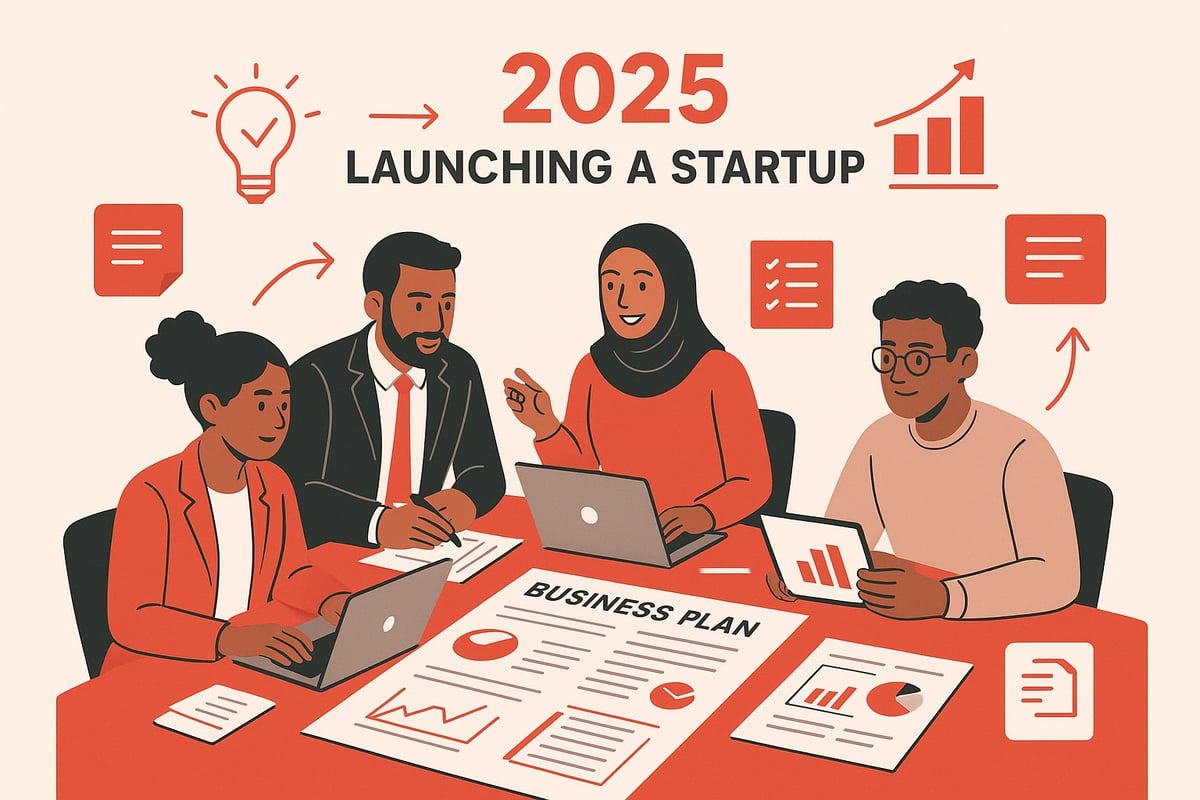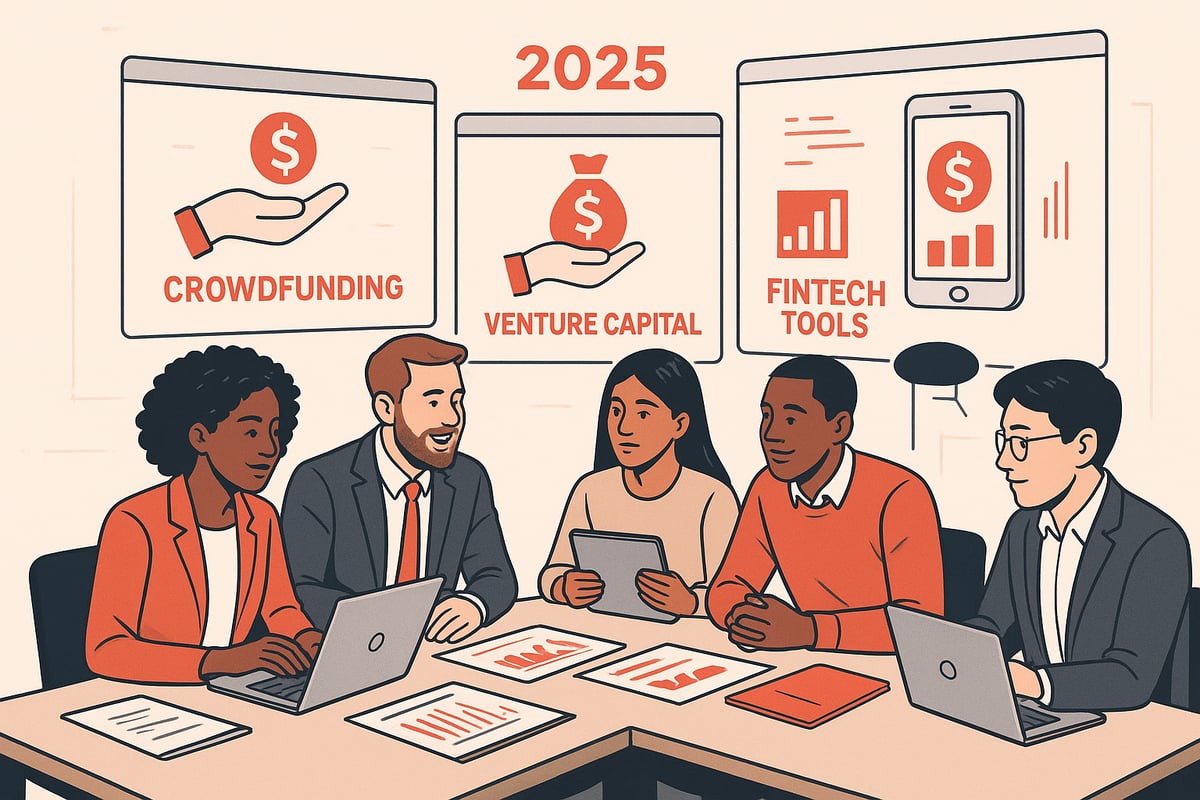Entrepreneurship Foundation Guide: Building Success in 2025
Are you ready to launch or grow your business in 2025's fast-paced world? The entrepreneurship foundation you build today will determine your success in tomorrow's competitive landscape.
This guide is designed to help both aspiring and experienced founders navigate the unique challenges and opportunities of 2025. You'll discover essential knowledge, proven strategies, and practical tools to set your business on the right track.
Explore core entrepreneurial foundations, step-by-step business building, vital skills, modern resources, and trends shaping the future. With startups rising and new obstacles emerging, now is the time to act on these insights and strengthen your entrepreneurship foundation.
Understanding the Entrepreneurship Landscape in 2025
The entrepreneurship foundation in 2025 is more dynamic than ever, shaped by rapid technological advances and shifting global priorities. Entrepreneurs today are navigating a landscape transformed by innovation, digital connectivity, and evolving consumer values.

Global Trends and Statistics
Entrepreneurship is on the rise worldwide, with more founders launching ventures in both established and emerging markets. According to Entrepreneurship statistics 2025: Key trends, insights & global data, startup formation has reached new highs, fueled by access to digital tools and increased appetite for innovation. This surge is especially notable in Asia and Africa, where ecosystem value is climbing rapidly.
Technology’s Transformational Impact
At the core of the entrepreneurship foundation lies technology. Artificial intelligence, automation, and digital transformation are not just buzzwords; they are essential drivers of efficiency and scalability. AI-powered platforms are helping startups analyze data, optimize workflows, and personalize customer experiences. Automation tools are streamlining operations, reducing costs, and freeing founders to focus on growth.
Consumer Behavior and Market Expectations
Modern consumers expect more from businesses. They demand transparency, speed, and personalization. The entrepreneurship foundation in 2025 must account for these expectations, as customers now choose brands that align with their values and deliver seamless digital experiences. Social media and direct feedback loops have made it easier for startups to adapt quickly to market shifts.
Remote Work and Decentralized Teams
The rise of remote work and digital nomadism is redefining how companies structure their teams. Decentralized collaboration is now a standard feature of the entrepreneurship foundation, enabling startups to tap into global talent pools. Teams operate across time zones, using cloud-based project management and communication tools to stay connected.
Sustainability and Social Impact
Sustainability and social responsibility have become core to the entrepreneurship foundation. Startups are integrating ESG (Environmental, Social, and Governance) principles into their models, seeking not only profit but also positive impact. Social entrepreneurship and sustainable business models are gaining traction, attracting both conscious consumers and impact investors.
Funding Landscape: Diverse and Accessible
Funding options have diversified significantly. Entrepreneurs can choose from venture capital, crowdfunding, syndicates, or bootstrapping. Alternative finance platforms are making it easier for founders to access capital, while investors are increasingly valuing mission-driven businesses that demonstrate both growth potential and societal benefit.
Regulatory Changes and Cross-Border Opportunities
Regulatory environments are evolving to accommodate digital business models and cross-border trade. The entrepreneurship foundation now includes an understanding of international compliance, data security, and intellectual property protection. This opens new markets but also requires founders to stay agile and informed.
Examples from the Field
- Startups leveraging AI to automate customer service, reducing costs and boosting satisfaction.
- Eco-focused companies gaining market share by offering sustainable alternatives in packaging or supply chains.
Key Takeaway
The entrepreneurship foundation in 2025 is built on adaptability, innovation, and a commitment to both technology and social responsibility. Entrepreneurs who embrace these trends are best positioned to thrive in a fast-paced, interconnected world.
Laying the Foundation: Essential Steps to Launch
Launching a successful business in 2025 starts with a strong entrepreneurship foundation. In today's fast-changing market, skipping the basics can quickly lead to failure. What does it take to build a business that stands the test of time and adapts to new challenges? It all comes down to following proven steps, making informed decisions, and using the right tools from day one.
A robust entrepreneurship foundation begins with idea generation and validation. Once you have a concept, you need to test it, research the market, and define what makes your offering unique. Next, you develop a lean business plan that outlines your goals, strategies, and milestones. Assembling a talented team, handling legal and compliance matters, and ensuring your finances are in order are also crucial to long-term success.
Here's a practical step-by-step guide to launching your venture:
| Step | Foundation Action | Purpose |
|---|---|---|
| 1 | Identify and validate your business idea | Ensure real market need |
| 2 | Conduct market research and competitive analysis | Understand industry and competitors |
| 3 | Define your value proposition and business model | Stand out and create value |
| 4 | Craft a lean business plan | Map your path and secure resources |
| 5 | Assemble a founding team and build company culture | Attract talent and foster collaboration |
| 6 | Legal setup, compliance, and IP protection | Avoid costly mistakes and protect innovation |
| 7 | Establish financial systems and funding strategy | Sustain operations and enable growth |
For a deeper dive into each stage of the entrepreneurship foundation, check out the essential steps to launch a business, which provides actionable insights and templates.
Consider the story of a 2025 tech startup that followed these steps. By validating their idea early, assembling a diverse team, and prioritizing compliance, they secured investment and scaled rapidly. This proves that a solid entrepreneurship foundation dramatically increases your odds of surviving and thriving in today's landscape.

Validating Your Idea in a Competitive Market
Validation is a critical part of the entrepreneurship foundation. Before investing significant resources, you need to prove there is real demand for your product or service. Rapid prototyping and minimum viable product (MVP) development help you test assumptions with minimal risk.
Start by conducting customer interviews and surveys. These direct conversations reveal pain points and whether your solution resonates. Next, use digital tools to run small-scale market tests, such as landing pages, social media ads, or even pre-order campaigns.
For example, a 2025 startup in the wellness space launched a simple MVP and collected pre-orders before building the full product. This not only validated demand but also attracted early investors. When you prioritize validation as part of your entrepreneurship foundation, you reduce risk and set yourself up for sustainable growth.
Remember, investors are drawn to ventures with proven demand. By leveraging data and feedback, you can refine your idea, pivot if needed, and build confidence in your business model. Market validation is the safety net every entrepreneur needs in a competitive landscape.
Building a Resilient Team and Culture
A resilient team is the backbone of any entrepreneurship foundation. Hiring people with complementary skills and diverse backgrounds fuels creativity and problem-solving. In 2025, with remote and hybrid work now standard, managing distributed teams effectively is more important than ever.
Startups that invest in psychological safety and innovation outperform their peers. According to McKinsey, diverse teams are 35% more likely to succeed. Consider a tech company that built a distributed team across three continents. By fostering open communication and shared values, they achieved high performance and rapid growth.
To strengthen your entrepreneurship foundation, focus on clear roles, transparent decision-making, and continuous learning. Use digital tools for collaboration and project management, and celebrate wins as a team. A strong company culture not only attracts top talent but also helps you weather inevitable challenges and adapt quickly to change.
Mastering Core Entrepreneurial Skills for 2025
Stepping into 2025, entrepreneurs are facing a business world shaped by technology, data, and global change. To build a resilient entrepreneurship foundation, mastering a new set of core skills is essential. These competencies are not “nice-to-haves” — they are the pillars that support lasting business growth and competitive edge.

Core Skills for the Digital Age
Critical thinking and problem-solving are at the heart of any entrepreneurship foundation. Entrepreneurs today must navigate complex data, spot patterns, and make informed decisions quickly. Digital literacy is now non-negotiable — founders need to understand AI, automation, and the basics of data analytics.
Staying ahead means embracing continuous learning. Technologies evolve fast, so upskilling is part of every successful entrepreneur’s journey. According to Entrepreneurship Trends That Will Change the Business of Building Businesses in 2025, adapting to new tech trends and digital tools is a key trait of thriving founders in the current landscape.
Financial and Analytical Acumen
A strong entrepreneurship foundation requires more than just vision; it demands financial fluency. Budgeting, forecasting, and understanding key metrics are vital for survival and scaling. Founders should be comfortable with digital financial tools, using data-driven insights to guide decisions.
Let’s compare the core financial and analytical skills that matter most:
| Skill | Why It Matters in 2025 | Example Impact |
|---|---|---|
| Budgeting | Controls costs, supports sustainable growth | Avoids cash flow crises |
| Forecasting | Anticipates market changes, plans ahead | Adapts quickly to new trends |
| Data Analytics | Informs product and marketing choices | Rapid iteration and scaling |
| Metrics Tracking | Measures progress and identifies bottlenecks | Targets what drives results |
Many founders now use AI-powered analytics to spot opportunities and refine their strategies. For example, a SaaS startup recently leveraged real-time product usage data to pivot their offering, resulting in a 40% increase in customer retention.
Modern Leadership and Communication
The entrepreneurship foundation of 2025 requires leaders who inspire and adapt. Emotional intelligence is critical — founders must motivate teams, handle stress, and foster innovation in both remote and hybrid settings.
Clear communication is equally important. With virtual collaboration as the norm, entrepreneurs need to negotiate, share ideas, and solve conflicts across digital platforms. Active listening and empathy can turn a simple conversation into a powerful tool for building trust and loyalty.
Sales, Marketing, and Rapid Growth
Personalization and automation are redefining sales and marketing. Entrepreneurs must master digital channels, craft compelling stories, and use automation tools to reach global audiences. The entrepreneurship foundation now includes skills like social media strategy, content creation, and customer relationship management.
Founders who embrace these skills can scale faster and more efficiently. One e-commerce founder used advanced analytics to segment customers, tailoring offers that boosted conversion rates and long-term loyalty.
Closing Thought
Skill gaps are among the main reasons startups fail, but with the right entrepreneurship foundation, founders can future-proof their ventures. By focusing on continuous learning and mastering both digital and human-centric skills, entrepreneurs position themselves for sustainable growth and adaptability in 2025.
Navigating Funding and Financial Management
Securing and managing capital is a core pillar of any entrepreneurship foundation. As 2025 unfolds, new funding models and financial tools are reshaping how startups thrive. Whether you are bootstrapping or pitching to investors, mastering financial management is non-negotiable if you want your venture to survive and scale.

Exploring 2025’s Startup Funding Options
The entrepreneurship foundation for any modern startup begins with understanding the diverse funding landscape. In 2025, founders can choose from:
| Funding Type | Pros | Cons |
|---|---|---|
| Bootstrapping | Full control, no dilution | Slower growth, personal risk |
| Angel Investors | Mentorship, early capital | Equity loss, investor influence |
| Venture Capital | Large sums, growth support | High expectations, significant equity loss |
| Crowdfunding | Market validation, community backing | Intensive marketing, platform fees |
| Syndicates | Collective expertise, pooled funds | Shared decision-making, shared returns |
Selecting the right mix depends on your business model, goals, and risk tolerance. Many successful founders start with bootstrapping or angel support, then scale through VC or syndicates as traction grows.
Preparing for Fundraising Success
A strong entrepreneurship foundation requires more than a great idea. Investors in 2025 want to see:
- A compelling, visually engaging pitch deck
- Clear financial projections and realistic milestones
- Evidence of due diligence, such as market research and legal compliance
Preparation is key. Refine your story, practice your pitch, and anticipate investor questions. Transparency and professionalism set you apart in a competitive funding environment.
Navigating Equity, Dilution, and Investor Relationships
Understanding the nuances of equity and dilution is vital. Giving away too much ownership early can limit future flexibility. Use simple cap tables to track shares, and model how each funding round affects your stake.
Building strong investor relationships matters as much as the capital itself. Communicate regularly, share updates, and seek feedback. Transparent, proactive founders often attract follow-on investment and strategic guidance, strengthening their entrepreneurship foundation.
Smart Financial Management and Fintech Tools
Sound budgeting, cash flow tracking, and forecasting are non-negotiable for sustainability. In 2025, fintech solutions simplify everything from cloud-based accounting to automated expense management.
Popular tools include AI-driven forecasting apps, digital invoicing platforms, and real-time dashboards. These resources empower founders to make informed decisions and avoid common financial pitfalls.
For a deeper dive into financial best practices, explore Finance essentials for startups, which covers crucial concepts for every entrepreneurship foundation.
Lessons from the Field: Data and Real-World Insights
Consider a startup that secured its first round through a syndicate, leveraging collective wisdom and rapid access to capital. By integrating fintech tools, they maintained tight control over spending and impressed investors with data-driven reporting.
However, only 40% of startups achieve profitability after five years, according to industry reports. The difference often comes down to financial literacy—an essential element of any robust entrepreneurship foundation.
Mastering funding and financial management is not just about numbers. It is about building trust, making strategic decisions, and laying a resilient foundation for long-term success.
Scaling and Sustaining Growth in a Dynamic Market
Scaling a business in 2025 is both an exciting challenge and a true test of your entrepreneurship foundation. The pace of change, powered by technology and shifting global dynamics, means founders must be more strategic than ever.
Operational Scaling: Automation, Outsourcing, and Process Optimization
The first step in scaling is optimizing your operations. Automation tools streamline repetitive tasks, freeing up your team for high-impact work. Outsourcing non-core functions, such as customer support or payroll, enables you to focus on growth. Process optimization ensures your workflows are efficient, scalable, and ready for increased demand.
Table: Key Scaling Methods
| Method | Benefit | Example Tool |
|---|---|---|
| Automation | Saves time, reduces errors | Zapier, UiPath |
| Outsourcing | Access to global talent | Upwork, Deel |
| Optimization | Boosts efficiency, consistency | Asana, Trello |
A solid entrepreneurship foundation helps you identify which areas to automate or outsource first, ensuring your resources are used wisely.
Expanding Into New Markets and Going Global
Growth often means reaching new customers beyond your initial market. In 2025, digital channels make global expansion more accessible. However, each market has unique cultural, legal, and consumer nuances.
Successful founders research local regulations, adapt their offerings, and build local partnerships to ease market entry. According to The Global Startup Ecosystem Report 2025, startups that embrace global mindsets are more resilient and attract international investment.
Your entrepreneurship foundation should include adaptability and global awareness, preparing your business for cross-border success.
Building Brand Authority and Customer Loyalty in Digital Spaces
In an era of information overload, standing out demands a strong digital brand. Consistent messaging, authentic storytelling, and proactive engagement build trust and loyalty.
Leverage social platforms, content marketing, and customer feedback loops. Personalization, powered by AI, can turn first-time buyers into loyal advocates.
A robust entrepreneurship foundation means you view branding as more than a logo—it’s about creating lasting relationships and delivering real value.
Leveraging Partnerships, Collaborations, and Ecosystems
No business scales alone. Strategic partnerships open doors to new customers, technologies, and distribution channels. Collaborating with other founders, joining business ecosystems, or participating in accelerators can exponentially accelerate your growth.
Consider co-marketing campaigns, joint ventures, or integrating with complementary platforms. Your entrepreneurship foundation should prioritize relationship-building and openness to collaboration.
Managing Risk and Preparing for Market Volatility
Scaling brings new risks—market shifts, supply chain disruptions, or regulatory changes. Proactive risk management is vital. Diversify your revenue streams, maintain financial buffers, and monitor key metrics closely.
Scenario planning and agile decision-making help you pivot quickly if needed. A resilient entrepreneurship foundation includes a mindset geared toward adaptation and contingency planning.
Sustainable Growth: Balancing Profitability and Impact
Modern entrepreneurs recognize that growth must be sustainable. This means balancing financial success with environmental and social responsibility. Sustainable business models not only attract conscious consumers but also future-proof your company against regulatory and market changes.
Data shows 60% of scaleups attribute their success to digital transformation, as highlighted in Global entrepreneurship trends in 5 charts. By building sustainability into your entrepreneurship foundation, you create a business that endures and thrives.
Scaling and sustaining growth in 2025 requires a holistic, tech-enabled, and values-driven entrepreneurship foundation. By embracing innovation, global thinking, and strategic partnerships, you can turn volatility into opportunity and set your business on a path to lasting success.
Future-Proofing Your Entrepreneurial Journey
Preparing your entrepreneurship foundation for long-term success in 2025 means more than just reacting to trends. It requires staying proactive, continuously evolving, and building lasting resilience. As the business world shifts, founders who anticipate change and adapt early are best positioned to thrive.
Embracing Future Trends
In 2025, trends like AI, sustainability, and remote work are shaping the entrepreneurship foundation for every new business. Founders must keep a pulse on emerging technologies and global shifts.
Consider the rapid rise of AI-driven automation or the growing demand for eco-friendly solutions. These forces are rewriting industry standards and consumer expectations. Staying ahead means actively monitoring trends, attending industry events, and joining thought leadership communities.
A simple table can help summarize current trends:
| Trend | Impact on Entrepreneurs |
|---|---|
| AI & Automation | Efficiency, data-driven decisions |
| Sustainability | Competitive advantage, compliance |
| Remote Work | Access to global talent |
| Globalization | New markets, cross-border growth |
Building your entrepreneurship foundation with an eye on these shifts ensures you are ready for what’s next.
Upskilling and Lifelong Learning
To future-proof your business, continuous learning is essential. The entrepreneurship foundation is strengthened by upskilling and embracing new knowledge.
Whether it’s mastering data analytics, exploring digital marketing, or understanding ESG standards, founders who invest in learning stay competitive. Online courses, masterclasses, and industry certifications offer flexible ways to keep skills sharp.
Set aside time each month for professional development. Make learning a core value within your company culture. This commitment to growth not only boosts your personal capabilities but also inspires your team to innovate.
Building a Strong Network
A robust network is a cornerstone of your entrepreneurship foundation. In fact, 80% of founders cite network support as crucial to their resilience.
Connect with mentors, industry peers, and communities that can offer guidance during challenges. Attend local and virtual events, join mastermind groups, and nurture relationships over time.
For deeper insights on cultivating resilient teams, explore building strong startup teams, which highlights how the right network and team structure drive long-term success.
Wellbeing and Work-Life Balance
Future-proofing your entrepreneurship foundation also means prioritizing personal wellbeing. The demands of entrepreneurship can be intense, making self-care and balance essential for sustainable growth.
Set boundaries between work and life, schedule regular breaks, and seek support when needed. Mindfulness, exercise, and open conversations about mental health help maintain clarity and motivation.
Remember, a healthy founder leads to a healthier company. Make wellbeing part of your leadership strategy.
Leveraging Feedback and Strategic Pivots
Continuous feedback is the final pillar in a resilient entrepreneurship foundation. Use customer insights, data analytics, and team input to guide your business decisions.
Many successful founders have pivoted their models in response to market feedback or disruption. Adopt an agile mindset, experiment with new approaches, and don’t shy away from change.
The ability to pivot quickly, backed by data and feedback, ensures your business not only survives but thrives through uncertainty.
You've just explored the essential steps to launching and scaling a business in 2025, from building a resilient team to mastering modern entrepreneurial skills. But success is about more than just knowledge—it's about who you learn from and connect with along the way. If you're ready to build on these foundations, join a community of ambitious Swiss founders who share your drive and curiosity. You don't have to do this alone—let's grow together, share insights, and support each other's journeys. Take the next step and apply to our swiss founders community.

